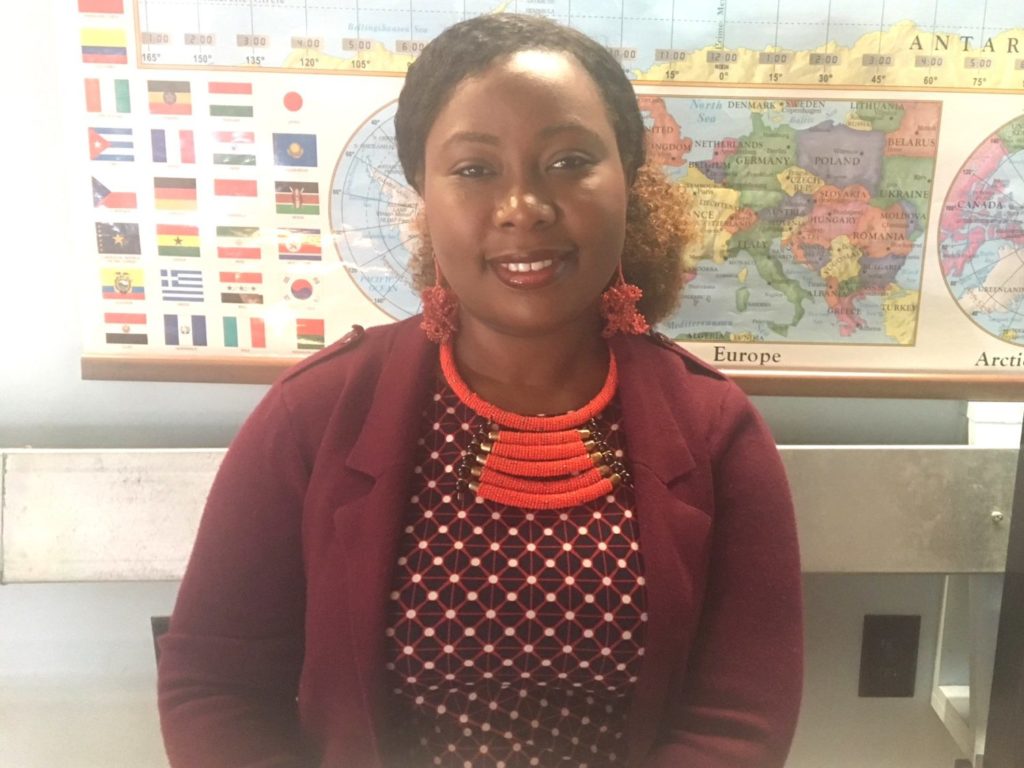Nearly all states have significant black/white infant mortality disparities, but Wisconsin has historically been one of the worst. In fact, the United Health Foundation indicated that Wisconsin’s black/white infant mortality rate disparity ratio of 2.9 is among the highest in the nation in its 2016 America’s Health Rankings.
Rachel Azanleko-Akouete, a public health nurse for Public Health Madison-Dane County, is on a mission to help change these disparity numbers. A passionate national and global policy advocate, she regularly educates elected officials so that they can make informed decisions. She firmly believes that good policies can undo what bad policies have created.
“As a black woman, college-educated, and middle-income, the birth outcomes are still comparable to a white woman who is not college-educated and who is low-income. That disparity is really sad,” Azanleko-Akouete tells Madison365 in an interview at Cargo Coffee on East Washington Ave. “Despite your educational background and despite your socioeconomic status, you still have poor outcomes as a black woman. What is leading to that?”
Azanleko-Akouete found the answer to that question and much more while recently working on her capstone project for her master’s degree in public health where she extensively researched the impact of stress, racism, and poverty on black infant mortality in Wisconsin.
“It took me about three months to complete this research. I’m very passionate about this topic,” she says. “I would like to give a shout out to my MPH Capstone Committee. Without their guidance and unconditional support, I couldn’t complete this research in three months.”
Azanleko-Akouete studied the role of toxic stress in maternal health and birth outcomes, and how policies to reduce such stress might improve black infant mortality. Among all developed nations, the United States has the highest rate of poor birth outcomes for mothers and babies.
She found that many interventions are in place to improve black infant mortality in Wisconsin, yet the upward trend of black infant mortality rates still remain persistently and unacceptably high.
“What is causing toxic stress? Racism. Racism is the number-one contributor to toxic stress. The more I did my research the more things I was finding out about toxic stress that were really sad. Toxic stress really impacts black women.” —Rachel Azanleko-Akouete

Rachel Azanleko-Akouete
State-level policy solutions that Azanleko-Akouete proposed from her research included initiating Medicaid support for housing services to reduce homelessness and other hardships, lift families out of poverty, and allow families to move to safer, less poor neighborhoods.
“I would also propose extending Medicaid Coverage post-partum through one-year,” she says. “Right now, Medicaid will end 60 days post-partum. Parents don’t have the coverage when they really need it, especially when it comes to post-partum depression. It is so prevalent, especially in African-American women.
“Just the fact of not having health insurance adds stress for especially black women. These women are already dealing with so many other stresses in their lives,” she adds. “This is something that we can fix to help these women.”
Her third solution revolves around eliminating the birth cost recovery policy—the practice that allows states to pursue the recovery of Medicaid supported birthing costs from non-custodial fathers.
“That policy is just a very dangerous policy creating a lot of inequities,” Azanleko-Akouete says. “Most of the women getting BadgerCare are black women and when they get the BadgerCare and they are not married, the state will use a child support agency to enforce that policy. So, even getting a letter from a child support agency is stressful, especially for parents.”
Eliminating this policy, she says, will reduce the stress that black mother’s experience, encourage early entry to prenatal care, and encourage continued presence in relationships by non-marital fathers.
Azanleko-Akouete was born and raised in Togo, West Africa. She came to America when she was 17.
“Coming to the United States was very challenging. We came right to Wisconsin. It was soooo cold,” she laughs, adding that Wisconsin was a destination because her family had relatives in the state. “I came with my parents and one big sister, one little sister and one little brother.”
Azanleko-Akouete has three brothers and sisters back in Africa. Once here, she learned English fast and went to Middleton High School. Her parents taught her about the importance of getting an education.
“My parents sacrificed everything to make sure we children got the education that we needed. They pretty much left everything behind [in Africa] so we could come here and get an education.”
“My mom and dad never had a chance to even go to high school or go to college,” she continues. “When my dad was 8 years old, he was sent to work as a maid. He had to wake up early in the morning and go fetch water and do all of this housework and do all of these things for his boss … even before he had a chance to go to school himself. He was so tired. He was not doing well in school until, finally, he left.”
But her father was always passionate about education. When he was 18, he put himself through an apprenticeship and he became an entrepreneur. Her father eventually built a successful construction business in Togo—allowing her and her siblings to get an education both in their home country and in the United States.
For Azanleko-Akouete, education has always been an absolute priority. “For me, growing up in a household that valued education so much and knowing that it’s OK to fail, but I can never give up … that was huge,” she says. “The confidence my parents instilled in me is why I am the person I am today.”
Azanleko-Akouete started her college education at Madison College before transferring to the UW-Madison to pursue nursing. After graduating and working for four years as a nurse, she decided to go back and get her master’s in public health.
“I believe that American citizens should really be aware of the fact that they are global citizens and we really have to invest more into the absolute determinant of health. I’m really passionate about global health, in general. Whatever is happening outside of the U.S. impacts us.”

“I love being a nurse, but at the same time having the MPH background is really important,” she says.
She’s currently a public health nurse for Public Health Madison-Dane County, where she supports individual, family, and community level needs by mobilizing partnerships, leveraging new or existing resources, and informing decision-making opportunities to improve health outcomes.
“I really love my job. I work in the community trying to identify new and existing partnerships,” Azanleko-Akouete says. “Really finding ways to see where the health department can better serve the community, serve the community, and center the community in decisions that we are making. By building all of these relationships in the community, they are able to tell us exactly what is going on.
“If we don’t take time to build these relationships, it’s hard to establish the trust,” she adds. “We can be addressing anything that we want to address. We can be pooling resources into anything that we want to support … but if we are not changing the policies that are contributing to the poor outcomes, it’s really hard to make real change.”
Azanleko-Akouete has already earned many accolades for her work: She is a recipient of the 2019 Wisconsin Public Health Association Presidential Citation Award, the 2018-2019 Madison Metropolitan School District Health Services Pathway Outstanding Project Partner Award, and the 2017 Carol Graham Emerging Leaders in Public Health Nursing award.
She is also very active outside her job. She is a volunteer for RESULTS, an international movement of passionate, committed everyday people. RESULTS advocates believe that they can use their voices to influence political decisions that will bring an end to poverty.
“I am a regional coordinator. I help others to really find their voices and advocating, building those relationships with policymakers,” Azanleko-Akouete says. “My goal is to help others find their own voice, especially minorities. I really like this African proverb—’Until the lion learns how to read and write, every story will glorify the hunter.’”
Azanleko-Akouete says that she would love a chance to show the public her research and raise awareness on these issues that hit too close to home for her. She hopes that she can also inspire younger people to tackle the health-related problems of today and tomorrow. Diversifying the medical workforce will help.
“There are many great researchers all over but having the lens of minorities to apply to that research is really important,” she says. “I really hope to inspire other young minorities to go for it, to work hard, and to find the people who want to support you … because that is so crucial to our future.”
Her advice to young people is to work hard to be a catalyst for change.
“I’ve been called a catalyst before and I believe that I am one. Challenge the status quo in constructive ways so you can achieve results in the system,” Azanleko-Akouete says. “We really need to inspire that next generation of researchers and public health nurses. We need more people who understand these situations and who have lived experience to be in these positions of power.”
By David Dahmer | originally published by Madison 365